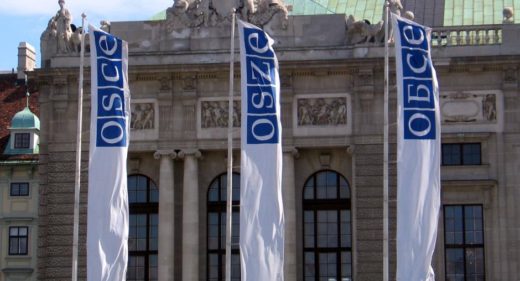Progress and challenges over three decades of safeguarding democracy and human rights: OSCE webinar series begins today
WARSAW/VIENNA, 28 September 2020 – The increasing challenges to the rights and freedoms at the heart of the OSCE commitments to human rights and democracy made 30 years ago, as well as the need for a greater understanding that only a dialogue based on mutual respect will enable us to overcome our common challenges, form the backdrop for a month-long series of webinars beginning today.
The webinars, organized by the Office for Democratic Institutions and Human Rights (ODIHR) in co-operation with the office of the Representative on Freedom of the Media (RFoM) and the office of the High Commissioner on National Minorities (HCNM), and with the support of Albania’s 2020 OSCE Chairmanship, will focus on topical issues of human rights, democracy and the rule of law that are critical for maintaining and strengthening security throughout the OSCE region.
“OSCE countries recognized 30 years ago that the security of citizens is only possible when their human rights are fully respected,” said Katarzyna Gardapkhadze on behalf of ODIHR. “The times we are living through are difficult, but they offer opportunities for progress that we must grasp with both hands. We look forward to seeing governments and civil society come together at these webinars to discuss how to turn these opportunities into reality for all.”
It was 30 years ago in Copenhagen and Paris that the participating States of the OSCE committed themselves to further protect and promote the human rights and fundamental freedoms of all citizens, as well as strengthen democracy and the rule of law. The 1990 Copenhagen Document and the Paris Charter for a New Europe were milestones in the history of the OSCE and represented landmark political agreements for the entire region, an area of more than one billion citizens. They cemented the Organization’s unique concept of security in which only pluralistic democracies, based on the rule of law and respect for human rights, can bring lasting security to the region.
“These webinars on some of the most urgent challenges for democracy and human rights are particularly important in this exceptional year, which has been overshadowed by the COVID-19 pandemic and its aftermath,” said Inid Milo, Head of Albania’s 2020 OSCE Chairmanship Task Force. “OSCE states and civil society will come together for what we hope are frank and open discussions, leading to real solutions that benefit citizens across the OSCE region.”
The series will open today with reflections from former Finnish President Tarja Halonen, the first woman to hold the country’s highest post, on the situation of human rights and democracy 30 years after Copenhagen. She said:
“We must keep in mind the optimism and inspiration we had 30 years ago when making the Copenhagen and Paris commitments. Today, it is ever more important to continue to defend the rules-based international order, promote and protect human rights and work to achieve sustainable development.”
The webinars will also discuss the importance of building and nurturing diverse and inclusive societies, which are able to learn more quickly from different ideas and traditions, and at the same time are more resilient during periods of crisis.
“The basic logic of integrating diversity is that everybody’s opinion matters and that all members of society are equal,” said Christophe Kamp of the HCNM. “It is vital that we strike a balance between majority and minority interests that allow everyone to maintain their individual identities, while at the same time realizing and valuing our shared interests. Thirty years on, the Copenhagen Document continues to provide a clear compass for achieving this.”
The ever-increasing role of technology in our lives, as well as a decline in government transparency in some places, have brought new challenges to freedom of expression and freedom of the media, as well as access to information. Not only are these freedoms cornerstones of the OSCE commitments to human rights and democracy, but they are vital tools for countering disinformation and ensuring a well-informed public debate.
“For our democracies to be both stable and vibrant, we need to encourage, facilitate and support the sharing of information, ideas and expertise,” said Jürgen Heissel of RFoM. “OSCE countries recognized the important role of journalism, an independent media, and a lively cultural environment 30 years ago to achieve these goals, and this remains just as true today.”
In a year affected overwhelmingly by the COVID-19 pandemic and its impact on our lives and societies, this series of webinars does not aim to cover the entire spectrum of the activities of ODIHR, RFoM or HCNM. At the same time, they will provide a much-needed opportunity to discuss tolerance and non-discrimination; the situation of Roma and Sinti; the rule of law; freedom of the media and access to information; multilingual education; and, finally, the role of human rights defenders and civil society in promoting and protecting human rights. Participants will be given an opportunity to put their questions or make recommendations via Zoom.
For more information and programme updates, please see the dedicated webpage with links to the individual events. Interested media and members of the public can watch the discussions live on ODIHR’s Facebook page.
